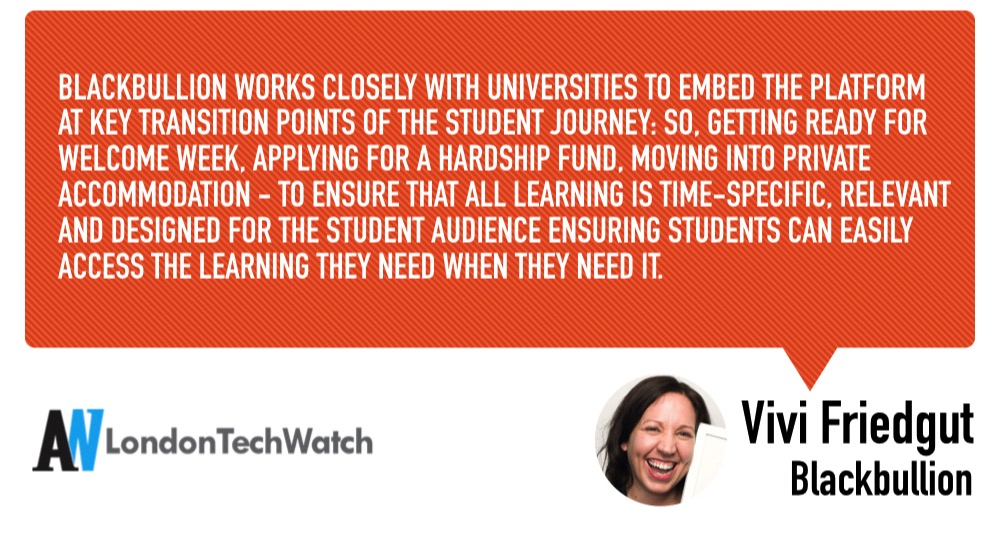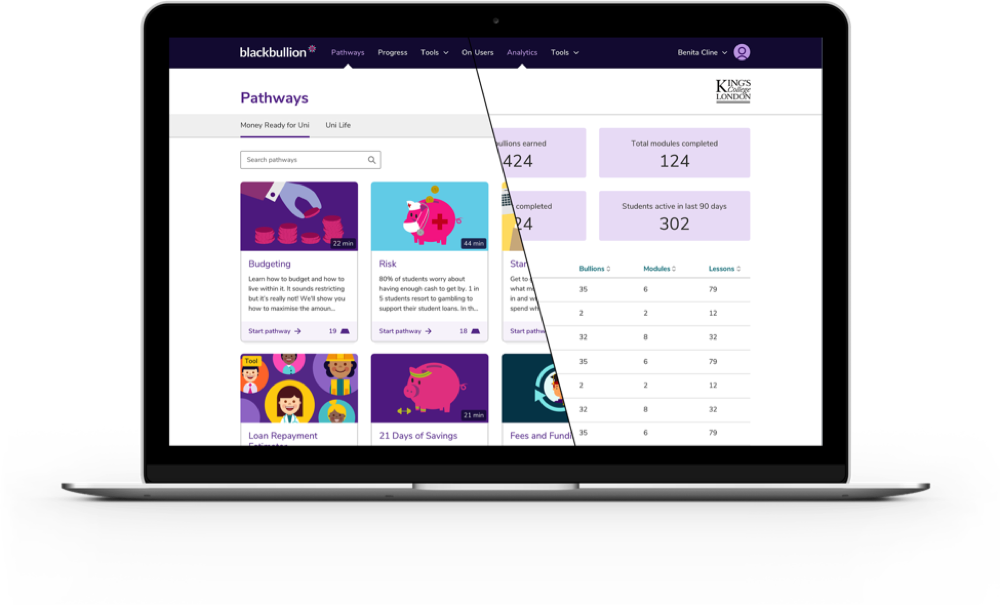“Tech for good” is a phrase that is not entirely common to hear but Blackbullion is a fintech education startup that fully embodies that notion. The educational platform, launched by a financial management expert, partners with leading UK universities like King’s College and the University of Edinburgh to teach young people about finance at crucial transition points in their lives starting with university welcome week, applying for a hardship fund, or moving off campus. With over 500,000 being supported by the platform, Blackbullion is the financial literacy curriculum that is becoming increasingly vital to the university population.
London TechWatch sat down with CEO and founder Vivi Friedgut to learn more about the company’s origin, future plans, and most recent round of funding.
Who were your investors and how much did you raise?
We’ve raised about £1M in total in two rounds, Seed £600K, closed in 2018 and post-seed £400K closed in 2019. Our key investors were 24 Haymarket, Emerge Education, MPA Education and private angels, including Lord Stanley Fink, who joined the board as Chairman.
 Tell us about the product or service Blackbullion offers.
Tell us about the product or service Blackbullion offers.
Blackbullion was founded in 2014 with a single purpose – to help young people develop their financial skills for life. Fast becoming the go-to financial platform for leading universities, Blackbullion currently supports 500,000 students, through partners including King’s College London, the University of Edinburgh, and the University of South Australia.
The target is 1 million by 2021. A champion of tech for good, the platform is actively integrated into university student recruitment and retention strategies, with a focus on widening participation students including first-in-family, care leavers, single parents, and students with disabilities.
What inspired you to start Blackbullion?
Prior to founding Blackbullion, I was a financial management expert, spending almost a decade managing the wealth of high net worth families and individuals. This inspired my mission of making financial education accessible for all. I am on a mission to empower young people by helping them build financial capability, open up the conversation around money and cultivate a healthy, money-smart mindset.
Would you ever consider creating a curriculum for even younger kids (pre-teens, teenagers) to learn about finance?
Well, I wrote a book called, Money Smarter – that is designed for parents of school-age children with lessons and conversation starters you can do at home to help teach your kids about money.
There are also some amazing Charities like MyBnk already focusing on helping young kids to learn about money.
How is Blackbullion different?
In the markets we currently operate, there are no direct competitors providing this service. We’re uniquely positioned to provide students with financial skills while supporting universities’ strategic objectives. When it comes to providing financial literacy itself, there are many B2C companies who provide some education content – there are also charities tackling similar issues. For us, the main difference is those companies rely on the user being proactively curious in the subject and seek information about a specific issue.
Blackbullion works closely with universities to embed the platform at key transition points of the student journey: so, getting ready for welcome week, applying for a hardship fund, moving into private accommodation – to ensure that all learning is time-specific, relevant and designed for the student audience ensuring students can easily access the learning they need when they need it.
In the USA, we have one competitor, Everfi (over 10 years old/raised over $250M in 4 rounds) which provides a similar service to schools and universities, but their business model is very different and their presence in our markets is virtually non-existent as they focus on the Americas.
What market are you targeting and how big is it?
Right now, we’re targeting HE market in UK, Australia, and NZ.
What’s your business model?
SaaS – using 3-tier yearly subscription
What was the funding process like?
I’d love to say it was smooth and easy but it was anything but. Through a series of circumstances, we found ourselves in a perfect storm of bad timing, Brexit distractions, and too many balls in the air. I’m really pleased with the result because the investors that came in for our second tranche will add enormous value.
Things always work out as they should. You can’t be a founder and not believe that.
What are the biggest challenges that you faced while raising capital?
We have created a blue ocean niche by creating new market space which we believe has the power to revolutionise a number of sectors, and for a first-time female founder, in education, that’s not an “easy sell”. Also, education is a tough space – investment isn’t as big or freely given and the market is slow with long cycles. We were lucky and we worked hard to attract investors who are as committed as we are to the space, while still recognising it might take a bit longer to build the critical mass we hope to achieve.
What factors about your business led your investors to write the check?
You’d have to ask them! But seriously, we are a genuine tech for good company and doing well while doing good is baked into our DNA. We’ve also achieved impressive penetration into a notoriously difficult and slow sector. While education isn’t seen as sexy as fintech (for example) it is a much larger market globally (second only to healthcare) but still very analog. We’re facing massive challenges in terms of the future of work, financial uncertainty, and an aging population so we are the tip of the sword. We also have a proven revenue model and a unique user acquisition model, so we’d like to think we are attractive as a business not “just” for our impact.
What are the milestones you plan to achieve in the next six months?
It is our ambition to be deployed on 35% plus of UK universities
What advice can you offer companies in London that do not have a fresh injection of capital in the bank?
Figure out how to make money. If you can make a dollar you can make a million. Warren Buffett says that “Only when the tide goes out do you discover who’s been swimming naked.” Businesses that are built on never-ending rounds of funding are actually far more precarious than those who have a proven business model. Investment ebbs and flows but revenue is forever. If you know you can pay your bills without needing to raise money, you’ll be in a far stronger position, be able to withstand bigger knocks, and will build a sustainable business.
If you know you can pay your bills without needing to raise money, you’ll be in a far stronger position, be able to withstand bigger knocks, and will build a sustainable business.
Where do you see the company going now over the near term?
Rewarding people for developing greater financial skills is the future of financial services. We believe this is the natural consequence of consumer demand (a generation in need), technological capability (open banking and digital innovation) and strategic necessity (lack of trust in financial services, mis-selling and public anger).
Blackbullion is in a unique position to dominate that future by acting as the conduit between financial services and the young people they wish to work with. We can support user acquisition and discoverability, and in doing so support our key mission of ensuring that whenever a young person encounters a financial decision, we are the go-to provider of financial education to guide them.
By addressing a specific pain point right across the financial services value chains we create a niche by further developing this new category of “education infrastructure”.
What’s your favorite outdoor activity in London?
Coffee in the sun and markets!






